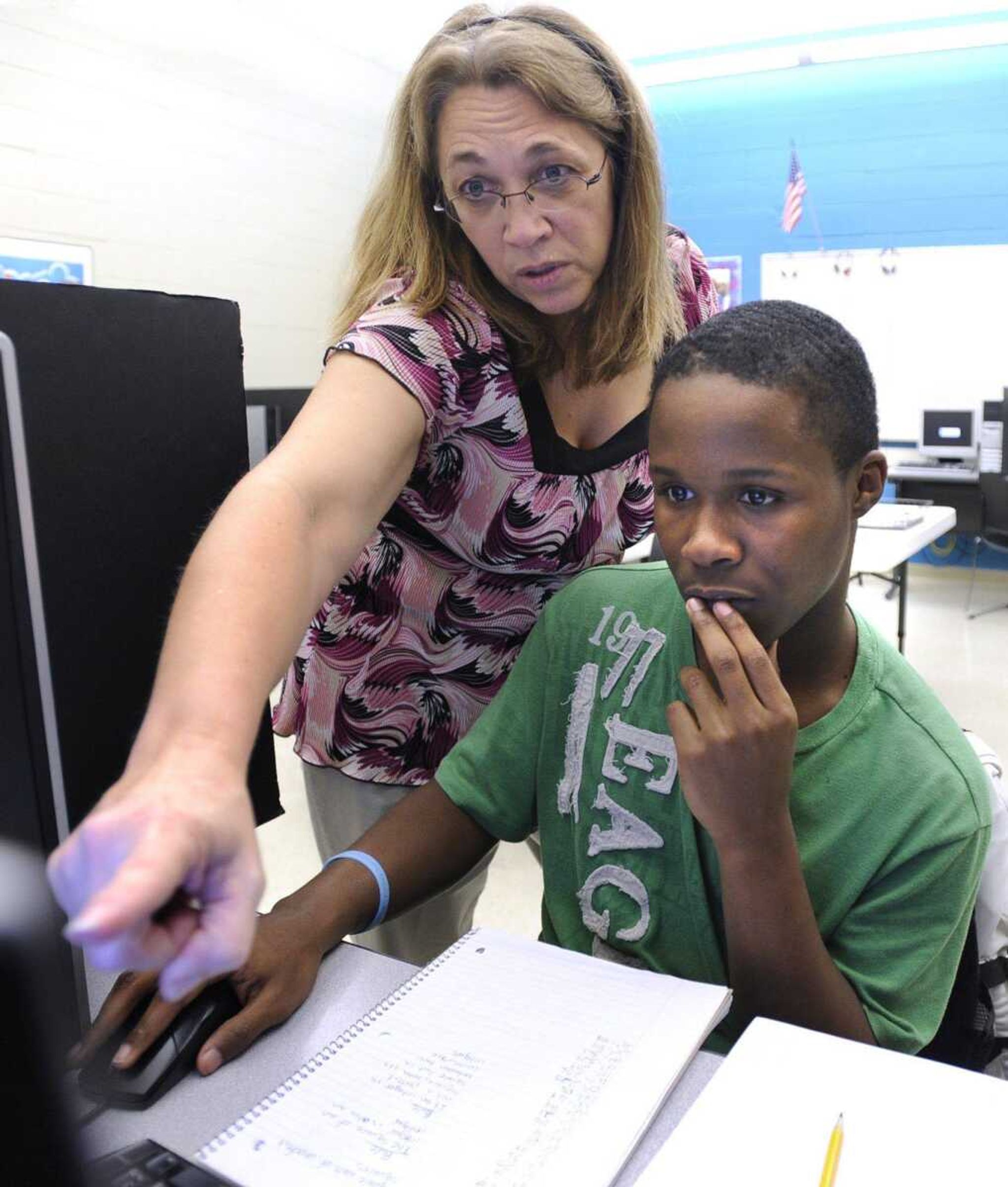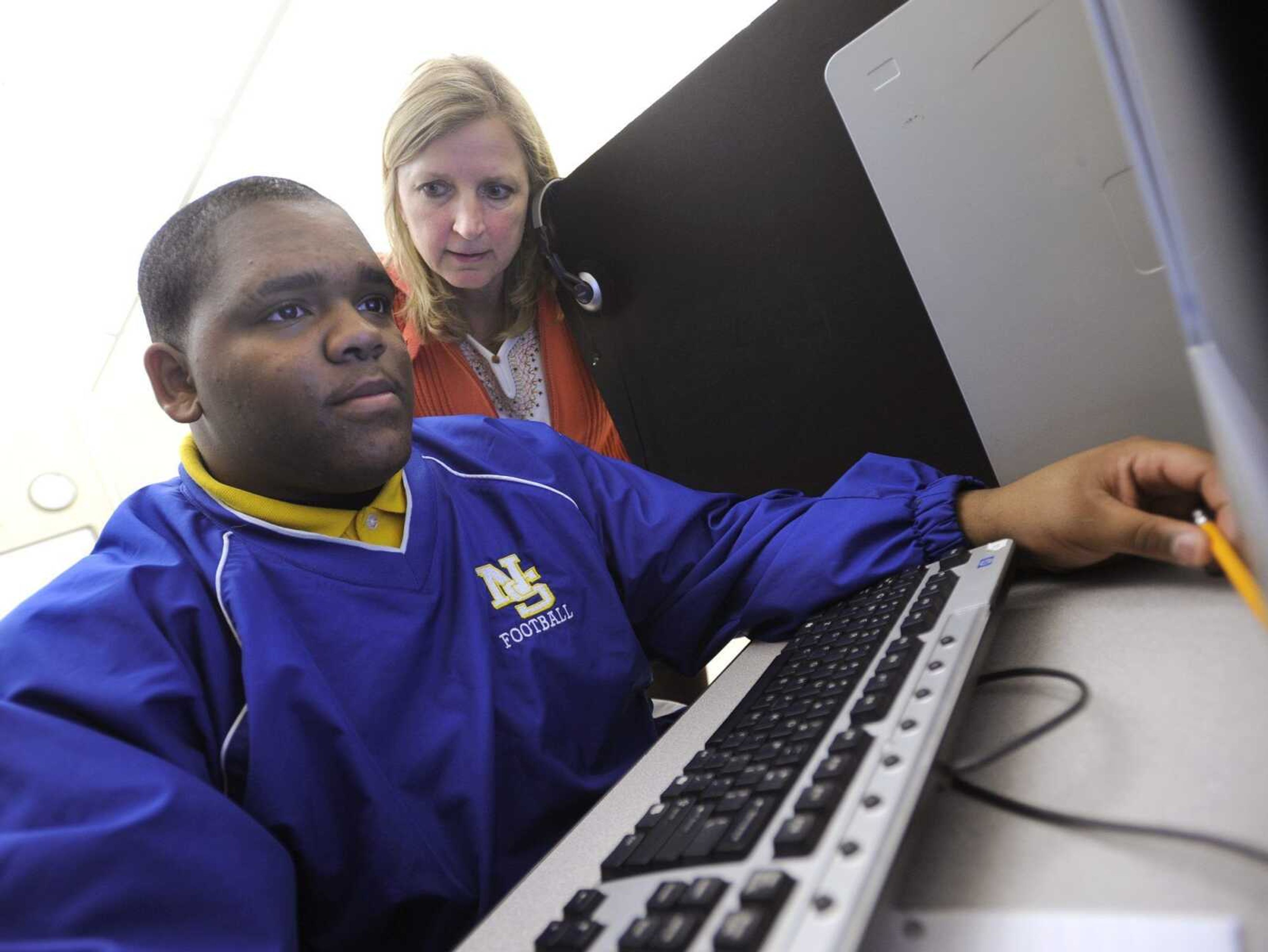Darieth Nunley worked on a problem for his consumer education course, trying to determine the annualized rate of income for a small business.
Nunley was all business as he studied in the quiet of the Cape Girardeau Alternative Education Center computer lab Thursday afternoon. He has to be -- if he wants to graduate on time with his classmates.
The senior was too far behind when he moved to Cape Girardeau from Tennessee, so he's playing catch-up at the education center's after-school credit recovery program. Nunley has booked 15 hours on the computer, with the assistance of program teachers, and if he finishes, he'll graduate in May. He plans to. He wants to go to college and play football.
Unlike his other classes at Cape Girardeau Central High School, there's no chatting, no downtime in this classroom. The eight students in the lab Thursday worked quietly on their individual coursework. Those who come in for the sessions have taken a critical step in turning their academic lives around.
"When they will take initiative after school, that really motivates you to help them, because they're invested, they have a desire to graduate," said Mary LeGrand, teacher and coordinator of the initiative aimed at getting at-risk students back on track to graduate.

The credit recovery program is ground zero in the battle against what some define as an educational crisis in Cape Girardeau, where more than 20 percent of public school seniors did not graduate last year.
A coalition of community members, sponsored by the United Way of Southeast Missouri, has spent more than two years examining the causes and conditions of student failure. The Education Solutions Team, made up of civic leaders, educators, administrators, businesspeople and members of the religious community, were charged with finding ways to boost the Cape Girardeau School District's graduation rate to 90 percent by 2019.
The United Way will release the full 61-page report, "Mobilization Plan for Ensuring the Success of Our Children," and the task force's recommendations at a luncheon March 31 at Drury Lodge.
While the findings show a complex array of problems facing schools and families, the answer, group members say, is relatively simple. The solution is community support -- volunteers with expertise in a range of areas filling the educational gaps schools and public funding can't.
"Our big message is we all have a role to play and we all have to find something we can do, as a business or as a church or as an individual, to reach out," said Nancy Jernigan, executive director of United Way of Southeast Missouri.
The problem
Cape Girardeau's graduation rate in 2010 was 78.4 percent. The numbers improved after district officials reviewed data they suspected was incorrect. Last fall, the rate was noted as 73 percent in the Missouri Department of Secondary Education's Annual Performance Report.
Despite the change, Cape Girardeau's graduation rate remains below Missouri's rate of 85 percent and well below that of neighboring Jackson School District, at 88.5 percent, and Scott City schools, at 90.5 percent.
The Education Solutions Team initiative was born out of the United Way of America's goal to raise the national on-time graduation rate from 73.9 percent to 87 percent by 2018, thereby cutting the number of dropouts in half.
As of 2007, the most recent data available, nearly 25 percent of American teens did not graduate on time, according to the U.S. Department of Education. Of that group, half did not earn any high school credentials.
Cape Girardeau's schools face different challenges than smaller communities, among them significantly higher poverty rates -- the common denominator of dropouts. Mobility also is a significant issue. Less than half of elementary students in Cape Girardeau remain with the same teacher for the entire school year, according to the report.
Central principal Mike Cowan said 225 students enrolled or withdrew from the school last semester. He said it's possible that number could be bested this semester.
"That is an almost insurmountable challenge," Cowan said. "We have to count them as a dropout until we receive information they enrolled somewhere else."
What's at stake
The nation's prison systems are filled with dropouts. Nationally, more than 75 percent of inmates did not complete high school, the Mobilization Plan report points out. Nearly 60 percent of adults sentenced to prison in Cape Girardeau County in fiscal year 2010 did not have a high school diploma.
"Unfortunately, the children of dropouts are also more likely to have children who also drop out of high school, which may be due, in part, to the environment dropouts create for their children," the report says.
Beyond the families affected, there is the price to the community. One estimation is that if the dropout rate remains the same for the next 20 years, the result will be a loss to the nation of $3 trillion in revenue, the report says. In Missouri, the 15 percent of students who failed to graduate last year are projected to cost $5.2 billion in lifetime earnings, according to the Alliance for Excellent Education.
The solutions
The Mobilization Plan report will include several goals to improve educational outcomes, goals that rely on support from the community and an army of volunteers. But much of the work, Jernigan says, is well underway and the results are helping academic achievement.
There's the Read to Succeed Program, funded through the United Way, where last semester the volunteer-based initiative brought 19 kindergartners to a first-grade reading level, Jernigan said. The United Way is looking to expand the program to all of Cape Girardeau's elementary schools through the help of a grant. There are school liaisons going into the homes of at-risk students, building relationships and connecting families to resources. The school district last semester launched a tougher attendance policy that includes jail time and fines for parents of students who miss an excessive amount of school. There's the tutoring program at the junior high serving scores of students weekly.
And then there's the after-school credit recovery program, which helped more than a dozen seniors graduate on time last year, according to Carla Fee, principal at the Cape Girardeau Alternative Education Center.
"I don't think people realize how much work we put in to try to keep these children in school," Fee said.
She said it takes a community to tackle the dropout problem, and it can start with a word. On a recent warm morning, Fee said she saw several teens who had dropped out of her building walking the streets.
"I talked to several of them and got a few of them to come back and enroll this next quarter," Fee said. "Everyone needs to be talking to these children and ask them, 'Why are you not in school, and how can we help you get back?'"
The bottom line, Jernigan said, is community involvement to help students succeed, which ultimately leads to the success of the community.
"If we continue to have as many dropouts as we have, the community will continue to suffer the consequences," she said.
mkittle@semissourian.com
388-3627
Pertinent address:
301 N. Clark Ave., Cape Girardeau, MO
1202 S. Sprigg St., Cape Girardeau, MO
Connect with the Southeast Missourian Newsroom:
For corrections to this story or other insights for the editor, click here. To submit a letter to the editor, click here. To learn about the Southeast Missourian’s AI Policy, click here.







